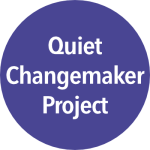Many quiet changemakers I speak with compare themselves to other changemakers in the media or who are known in their social change/entrepreneurship/innovation circles, and feel like they don’t measure up.
What’s the secret to the uber-successful?
They are faking it.
Faking it until they make it. Presenting themselves as they hope to be, not necessarily who they are now.
Talking about a project as a done deal, when really it’s in its infancy and funding is sketchy and the board of directors is in chaos and their full time job is pulling them away from achieving true success.
Acting the entrepreneur, working independently/consulting, when really they still hold down their old job, they have few/no clients, and they have no idea how they are going to pull it off without going into debt.
This isn’t bad, it’s just doesn’t present what it’s actually like to move an idea forward. It’s like Facebook, where everyone share the best of themselves, leaving the vulnerability and sadness in the dark, leading to us feeling that we don’t measure up to friends, when the truth is we’re all just trying to survive in a world of uncertainty.
Doing great things isn’t easy. It takes time, effort, failure, try-trying again.
Spend less time on your issues, and more time on your purpose.
It means being vulnerable. It means understanding that many of us feel like impostors. It means deliberately making mistakes in order to move ahead. It means getting your stuff out there before it’s perfect.
Fake it until you make it.
Am I faking it with the Quiet Changemaker Project?
You betcha! In reality, I have little idea what I’m doing here with Quiet Changemaker Project. It’s an idea I had, that, when shared with others who I identify with, drew interest and excitement. It seems to resonate with people.
I want to write a book, because….introvert. I enjoy having intimate conversations with other people ‘like me.’ While I sort out what a book might look like, I thought I’d build a website, learn and share with others I might not run across in my interviews.
Sometimes the rest of my life pulls me away from spending the time I’d like to spend on this project. Also, this is a passion project, and doesn’t pay any bills.
So, I’m just muddling through like most people, trying to focus on my purpose. And, as most people, I appreciate the support.
